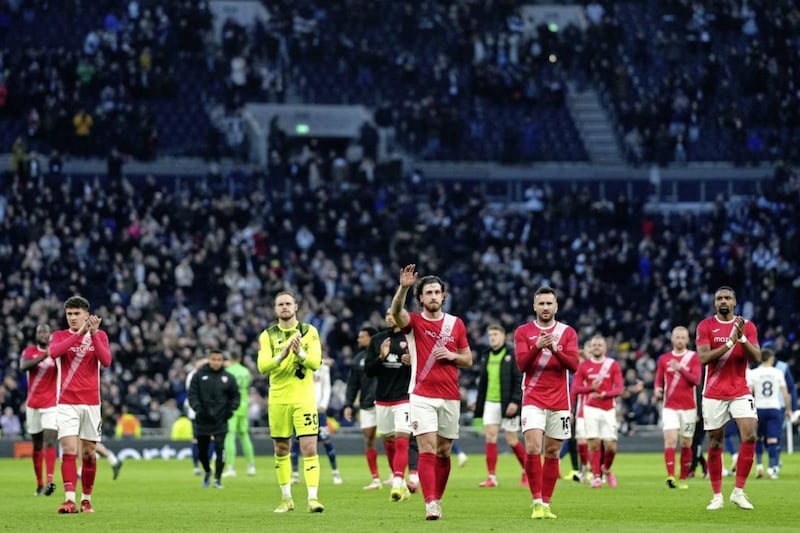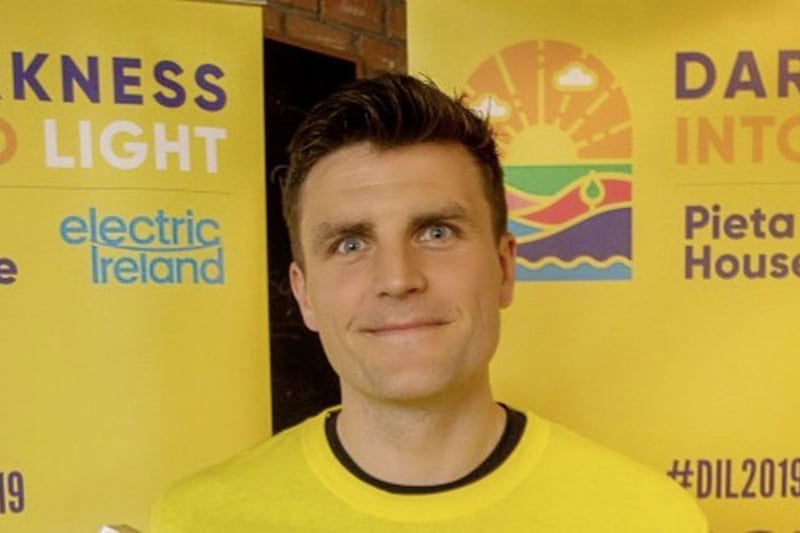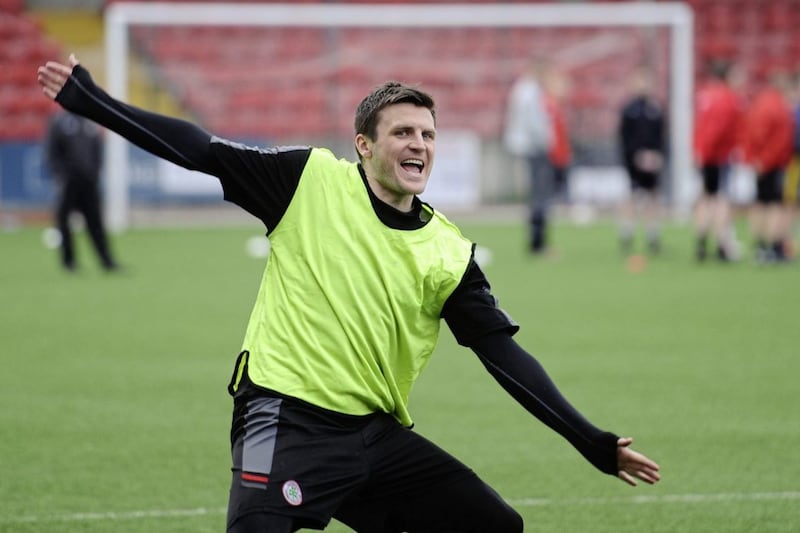THE kid from Killarney had the world at his feet. Scouts gathered like moths around firelight.
Diarmuid O’Carroll was a child prodigy, a scoring machine who could trap a ball if it fell from the sky.
At 15, the Home Farm striker was living the dream at Celtic Football Club.
At 29, he’d retired.
There was no career-threatening injury to force the Kerryman’s hand.
No contractual disputes.
No disillusionment with the game. That came much earlier in his career.
No managerial spats.
In his last four years in the Irish League he won four championship medals – two with Cliftonville and two with Crusaders.
He had some good years ahead of him, maybe some of his best.
Now 30, he still loves the game.
So why retire?
Why give up on that indescribable feeling of hitting the back of the net and that second’s delay of the roar from the stands and bathing in it?
O’Carroll says: “I understand that because I still love the game and people ask me now and probably my easiest answer is: ‘I just couldn’t be bothered playing any more.’”
The real answer is a much deeper one.
In short, he's merely replacing one passion with another: coaching.
“Three or four years ago I started asking myself: ‘If I can’t be a professional footballer and I still love the game, I want to help other people in the game. How can I do that?’
“If I could get my ‘A’ licence, if I could get a degree, work with the IFA and get experience, I’d be in a position where I can go back and work and be the person who could have helped me and should have helped me [as a young footballer]…
“People have said: ‘You’ll regret it in the long run.’
“I may regret not playing for another year or a year-and-a-half maybe, but in my eyes I want to be in a professional environment every day when I’m 31, so me delaying that process (by continuing to play), I wouldn’t be as good a coach or as good an academy manager or an educator. I’m now impatient. I want to be at Man United when I’m 34.
“People might think that’s arrogant but if I want to work at Man United I need to get a leg-up… It’s getting ahead of the game.
“To say that to someone on the street, they’ll immediately think: ‘His head’s in the clouds.’”
He received a text from a friend recently, informing him that the Hoffenheim manager [Julian Nagelsman] is 30 and to get a move on.
“You look at Brendan Rodgers and he got ahead because he started young, Eddie Howe started young. The modern notion is that they’ll give a younger guy a chance. That’s my angle.”
For the last three years O’Carroll has been working as a Club & Community Development Officer with the IFA and is the Academy chief at his former club Crusaders.
He occasionally joins in with the Crues boys at training and still gets a kick out of dropping the shoulder and finding the top corner of the net.
Sean O’Neill, the Crusaders goalkeeper, would shout: ‘He’s back, he’s back. Get that man to sign a form!’
But that boat has sailed.
O’Carroll’s eyes are firmly fixed on cutting it among the coaching elite but he still looks in his rear view, not for nostalgic reasons but because it helps form the road ahead of him.
In October 2002 O’Carroll and a few of his friends – Darren O’Dea, Gareth Christie and Gary Walsh - found themselves, quite literally, in Paradise.
The young Celtic recruits’ digs were “fantastic”, their manager was the legendary Tommy Burns and they helped form one of the most successful Celtic youth teams, alongside the likes of Republic of Ireland international Aiden McGeady.
In the early days O’Carroll was flying.
He could do no wrong as the young Hoops swept all before them.
“When I was younger I wouldn’t have thought I was arrogant - but I did have an arrogance about my game, which all players going through the ranks have.
“I didn’t really appreciate what anybody told me because I thought to myself: ‘I’m better than what you want me to do anyway.’
“Then I got injured.”
Oesteitis Pubis – inflammation of the pelvic bone – sidelined the Kerry teenager for several months, probably as a result of playing both Gaelic football with Dr Croke’s and soccer for Killarney Athletic back home.
When he returned to action O’Carroll never felt quite the same.
Physically, he was in good condition. Mentally, he was struggling.
“I always had in the back of my head: ‘I’m not right. I’m not 100 percent. I’m still coming back from injury.’”
What came naturally to him – touch, passing, scoring goals – became a real battle.
He became racked with self-doubt.
“If I had a bad shooting drill on a Monday that was me, I couldn’t think of anything else. That was me done until about Thursday or Friday, and even then it might have affected me in the next match; the next shot I had which mightn’t be for a few weeks.
“It was a tough scenario and hard to describe to people because when you’re a footballer, it is everybody’s dream, but you go home at one o’clock and there was this self-doubt and beating-yourself-up mentality, and I’d be beating myself up until two o’clock in the morning until I’d go to sleep.
“And then you’re doing it again the next morning. You have no other real social outlet.”
He adds: “My biggest regret was that I didn’t go and do a degree or something which would have occupied my thoughts with something else.
“All I did was come home and play FIFA [PlayStation]. Again, it was all football.
“So when you think about it, your whole life is dominated by one thing, that if you have a bad morning then it just kills the whole week.
“There was an element of fear. You hear it all the time from players: ‘Be brave’, you need to want the ball. The good players lose the ball and bounce back.
“If I had a very bad first 10 or 15 minutes and my first four or five touches were poor, you reach the stage where you say: ‘I can’t fail’. But on a football pitch it’s very, very difficult.
“If the ball comes across the box and it’s an open goal and requires a one-touch finish, the last thing you need to be thinking about is ‘Don’t lean back, don’t put it over the bar, don’t look stupid. You’ll get abuse about this for weeks.’
“The small bit of self-doubt can fester into basically ruining your love for the game.”
In his fifth and final year at Celtic, O’Carroll had sessions with a sports psychologist.
“He was all about visualising stuff and forgetting about the negatives,” O’Carroll recalls.
“He thought if I visualised the positives so often that would over-ride my negative thoughts.
“When the ball was coming to me and a Celtic jersey on my back, people were probably thinking that I was brilliant but all I could think of was: ‘Don’t f*** it up, don’t mess it up, don’t have a bad touch.’
“The easiest way to describe it is, if you say: ‘Don’t think about a pink elephant’, it’s the first thing you think about it.”
A series of loan moves signalled the end of his Celtic career. He had spells with Ross County, Airdrie United and Morcambe.
The best part of his time at Celtic was having the late Tommy Burns as his manager for four years.
The former Celtic boss was the reason, he says, why he’s pursuing a career in coaching.
“Tommy had the full package.
“You can’t pinpoint it. He was all about work ethic and giving everything. He was an arm around the shoulder but the mental side of my game was maybe later on when he wasn’t directly involved with me. He could break the tension with a joke and he was also a brilliant technical coach.
“He taught me the game. He painted realistic pictures of what would happen in a game.
“I know we generally glorify people when they’ve passed away but Tommy was this at the time. He was just everything you needed and was a genuinely good guy as well.
“When I’m coaching now, I think: ‘What would Tommy do in this situation?’ I do find myself looking back at what he was telling me. You could write a book about him.
“He was just an inspiration to all of us. Talk to Aiden, talk to Darren, to Charlie [Mulgrew], anyone who came across him, and they all think he was different class.”
O’Carroll met his future wife, Anne – a Belfast native – while still at Celtic.
After a brief spell in Iceland, he walked away from full-time football and moved to Belfast.
He fell out of love with the game, so much so that he says he wouldn’t have played a five-a-side for a £1,000.
But when he arrived in Belfast he’d no income and no education – so when Glenavon called him in 2011 he couldn’t turn them down.
He credits the-then Glenavon manager Packie McAllister for re-awakening his love of playing football.
“I can’t remember the exact wording, but Packie said: ‘You need to wise up here. What are you doing?’ And I went on the back foot.
“He said: ‘You’re in second gear. You’re wasting your own time. You’re wasting your own ability.’
“Even though he was coming towards me in a negative way, he had huge belief in me… It was like a switch went off in my head.
“He gave me the kick up the arse I needed. I understood. I think he was a major reason why I went to the Reds through his friendship with ‘Skin’ [Gerard Lyttle, who was Cliftonville coach at the time], and from there I loved it.”
A player with guile, touch and awareness, O’Carroll became a favourite with the Reds fans where he won back-to-back league titles.
He moved on to north Belfast neighbours Crusaders and although he didn’t get the game-time he wanted he still collected two more league winner’s medals before bowing out of the game as a player at the end of the 2015/16 season.
He feels he could have achieved more when he was across the water but doesn’t look back with many regrets and is thankful for the education he got, particularly at Celtic.
“I could have been leaner and I could have been quicker. But you’re in your comfort zone. There were things you were very, very good at – but I didn’t enjoy ladders, I didn’t enjoy sprint training or strength and conditioning and stuff like that which would have made me a bit quicker. It might have given me 15 more starts in a season and 10 more goals.
“I had technical ability, I had the awareness, I could read the game, I could play the game… By the time I arrived at Cliftonville my priorities had changed.
“I always said to Anne, when I was 24 or 25, I would have been more suited to full-time football at that stage in my life. I knew what was important in life. Football wasn’t the be-all and end-all.
“There is regret where I didn’t do myself justice. I know my career has an asterick.
“But I don’t have any feeling towards that regret. I’m mature enough to know that I made mistakes and I didn’t fulfil what I should have done.
“If you ask McGeady or you ask Darren [O’Dea] or any of the boys, they would say I was flying and it was my own fault that didn’t play at their level. But that’s fine. I accept that.
“At the time I couldn’t give another 10 per cent because my love for it wasn’t there.
“But if I can change that and have a better career as a coach I’d be happy with that.”
He adds: “I don’t believe a good coach has to be a former player. But because I was in certain scenarios I can empathise with people; I know how they’re feeling when it comes to a certain situation, even if it’s a case of saying: ‘Listen, kid, don’t worry about it. It’s not the end of the world. It’s fine.’
For O’Carroll, there is plenty of rear-view reflection.
But that’s where the best life lessons are found and how they are already nourishing a long-held passion and fuelling his desire to be the best that he can be in his chosen field.








